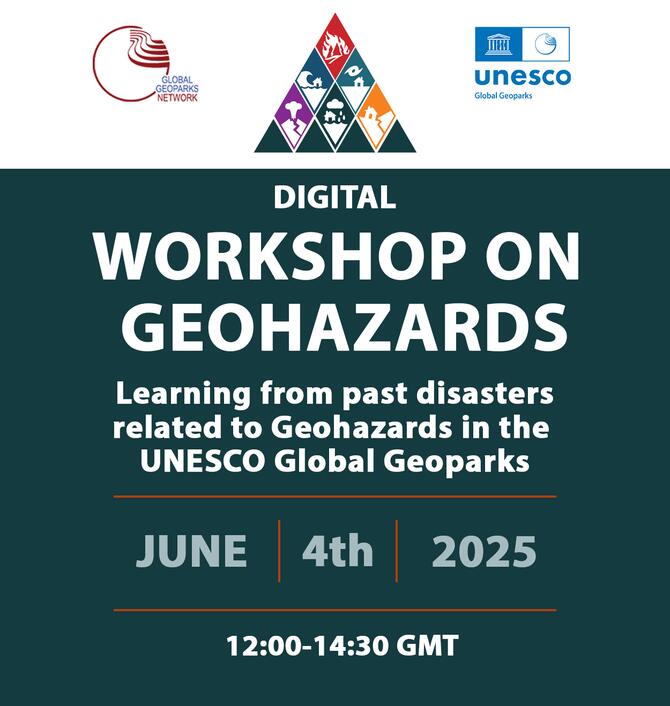GGN Working Group on Geohazards - Digital Workshop On Geohazards - 15-2025
GGN Working Group on Geohazards
Digital Workshop
On Geohazards
4th of June, 2025 – 12:00-14:30 GMT
We would like to announce that on Wednesday 4th of June, 2025 the GGN Working Group on Geohazards is organizing a Thematic Digital Workshop entitled “Learning from past disasters related to Geohazards in the UNESCO Global Geoparks.
During the Workshop colleagues from all around the globe will present various hazards in the UNESCO Global Geoparks as examples, but also actions for recovery and mitigation.
The Workshop will be hosted through zoom platform on the link below:
Join Zoom Meeting
https://us02web.zoom.us/j/82737020620?pwd=D9hraErJUc8uvv9yyVYL8BbFwCBk3k.1
Meeting ID: 827 3702 0620
Passcode: g4jAp2
Participants: Managers and management team members of UNESCO Global Geoparks
Purpose:
To date, disasters caused by geohazards have occurred in many parts of the world, and the 229 UNESCO Global Geoparks are no exception. In addition, geohazards have become more complex and severe due to the effects of recent climate change.
In this workshop, participants will share the actual situations of disasters caused by various and complex geohazards that UNESCO Global Geoparks have recently experienced, as well as their experiences and lessons learned.
Through this exchange of views, it is expected that the participants will work together as a network to take actions for disaster risk reduction and strengthening resilience to natural disasters.
Workshop Agenda
Welcome and introduction (5 min) by Prof. Nickolas Zouros, President of GGN
Welcome by UNESCO (5 min) by Kristof Vandenberghe, Chief of Earth Sciences and Geoparks Section
GGN and EGN Working Groups on Geohazards (10 min) by Setsuya Nakada and Alessia Amorfini
Lightning Pitch Session: Geohazards in UGGps (5 min each, total 70 min)
1) The impacts of the largest socio-environmental disaster of Rio Grande do Sul State in the Quarta Colônia UNESCO Global Geopark, Brazil
Luciano Marquetto, Quarta Colonia UGGp (Brazil)
2) Experience of the book "Following in the footsteps of the giants of Kütralkura"
Maria Angelica Contreras, Kütralkura UGGp (Chile)
3) Geohazards Mitigation at Mount Rinjani
Meliawati Ang, Rinjani-Lombok UGGp (Indonesia)
4) Massif Rockfalls triggered by an earthquake in 2015
Felix Tongkul, Kinabalu UGGp (Malyasia)
5) How should we record and transmit infrequent large earthquake? Insights from the 2024 Noto Peninsula Earthquake, Japan
Takuma Katori, Itoigawa UGGp (Japan)
6) Geohazards and Recovery: Responding to Wildfire in Cheongsong UNESCO Global Geopark
Seongok Ju, Cheongsong UGGp (Republic of Korea)
7) Geohazards protection and reduction in the karst area of the Shilin UGGp
Bao Jihong, Shilin UGGp (P.R. China)
8) Raising Awareness of Debris Flow Hazards through Geomorphological Mapping
William Bombarda, Adamello-Brenta UGGp (Italy)
9) Assessment 4 years after the deadly floods of 2021 on the edge of the Geopark Famenne Ardenne: consequences for the territory and Geopark initiatives
Serge Delaby & Mar Tapia, Famenne-Ardenne UGGp (Belgium)
10) Remote Sensing Innovation: Puigcercós, a natural lab for testing landslides and rock-falls monitoring techniques
Mar Tapia, Origens UGGp (Spain)
Discussion – Proposals from UNESCO Global Geopark managers (30 min)
Strategic Action Plan of Geohazards Working Group (5 min) by Babbis Fassoulas
Understanding local risks - questionnaire roll-out (10 min) by Alessia Amorfini
Closing remarks from Geohazards Working Group and GGN
